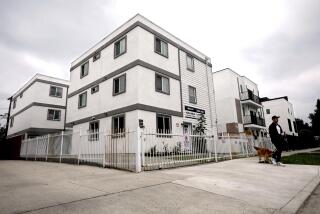Sheltered for the Night, Missed by the Census
- Share via
Maria Doutney sits on the second-floor railing of the low-cost Glendale motel that has sheltered her and infant daughter, Michelle, for the past five nights.
Behind her is a bustling stretch of Colorado Street, lined with brightly lighted signs for fast-food restaurants, liquor stores and less-than-luxurious inns. This is Tuesday, March 20, the night U.S. Census officials are attempting a nationwide tally of the homeless.
By mid-evening no census officials have found Doutney. Social service workers have given her motel room vouchers so that she and her daughter do not have to sleep on Glendale’s cold--and sometimes dangerous--streets.
“Most people cruising without a home are mentally disturbed,” Doutney says. “There’s one lady cruising around Brand Boulevard, and she’s really nuts. She has a grocery cart with all her things in it. I don’t know how she showers.”
Doutney, 22, has relied on motel vouchers since splitting up recently with her husband. “If I didn’t know about this, I could be out on the street, too,” she says.
Glendale has no shelters for the homeless. But local churches and social service agencies issue vouchers that allow some homeless people to reside at low-cost motels, usually for just a few days.
The greatest number of homeless in Glendale are aided by the Salvation Army. The organization used most of a $38,000 city grant last year for motel vouchers, which pay for rooms that usually cost $17 to $33 per night.
In the homeless count this evening, census guidelines call only for visits to motels that charge $12 per night or less, says Helen Davis, district manager of the regional census office in Pasadena, which also serves Glendale.
In 1989 the Salvation Army provided about 2,000 nights of voucher lodging to Glendale’s homeless, says Lt. Kenneth Hodder. In addition, the Los Angeles County Public Social Services Department provides money that can be used for temporary lodging.
While grateful for her room at the Manhattan Motel, Doutney, a native of the Philippines who married an American tourist two years ago, says it is not the same as having a home of her own.
In temporary lodging, she says, “You don’t get to fix your own place up. It’s not comfortable living in a motel. I need a roof to sleep under and a bathroom to take a bath in. But it’s not enough. I want to have my own place and my own car.”
The young mother hopes to find a baby-sitter, get financial aid and learn a trade at Glendale College. In the meantime, she says, “I’ve got to live somewhere.”
Elsewhere at this motel, in a cramped unit littered with fast-food wrappers, Arthur Henry, 36, and his wife, Mercury, are caring for their five active children. The youngest is 3-month-old Miranda. The eldest is 9-year-old Max. In between are Kimo, 4, Majestic, 6, and Ming, 7.
By 8 p.m., no census worker has counted this homeless family. Nevertheless, Henry endorses the project. “If they know how many homeless people there are, they’ll know how much they should put forth for assistance,” he says.
The family moved from Chicago’s South Side about a year ago. “The weather was too cold, and we couldn’t afford the cost of heating during the winter,” Henry says.
But finding a home in the Los Angeles area has proved difficult. “They won’t let a large family like mine occupy a two-bedroom apartment,” he says. “If we do find a three-bedroom, it’s too expensive. Then you can’t come up with the first and last month’s rent.”
He says he has no car and must search for painting jobs and other short-term work on foot.
Though he has exhausted the assistance offered by some Glendale social service agencies, Henry is reluctant to move his family to low-income Los Angeles neighborhoods frequented by drug users and prostitutes. Glendale, he says, ‘is not as dangerous.”
At the Bell Motor Hotel a few blocks away, Gloria DeWett sits outside a row of numbered doors, cradling a sleepy child in her lap. DeWett says she wound up living here after she withheld rent payments on a deteriorating home in Highland Park and was evicted.
“I’ve been here probably for three years,” she says. “My youngest son’s 2 years old. I was here before he was born.”
DeWett, 39, shares a two-bedroom unit with her youngest son, Eddie, and her older children: Anthony, 18, Robert, 15, and Maureen, 12. She says her county assistance checks pay the motel bills, and food stamps feed the family.
In her unit, she cooks with electric skillets and a microwave oven. DeWett says she is on a waiting list for subsidized housing.
By 9 p.m. no census worker has visited her family. She is unaware the homeless are to be counted this night.
“I like it here because it’s quiet,” DeWett says of the motel. “I’d rather have a house or apartment. If I had the money, I’d like to get one.”
In the dark courtyard, daughter Maureen and a few friends are playing with a jump rope and a Hula Hoop. “The only thing I like about this place is the pool,” says Maureen, a sixth-grader at John Muir School. “But I don’t like anything else.”
She would gladly trade the tiny motel unit for a more traditional home. “I want my own room,” Maureen says, “and some privacy.”
More to Read
Sign up for Essential California
The most important California stories and recommendations in your inbox every morning.
You may occasionally receive promotional content from the Los Angeles Times.













